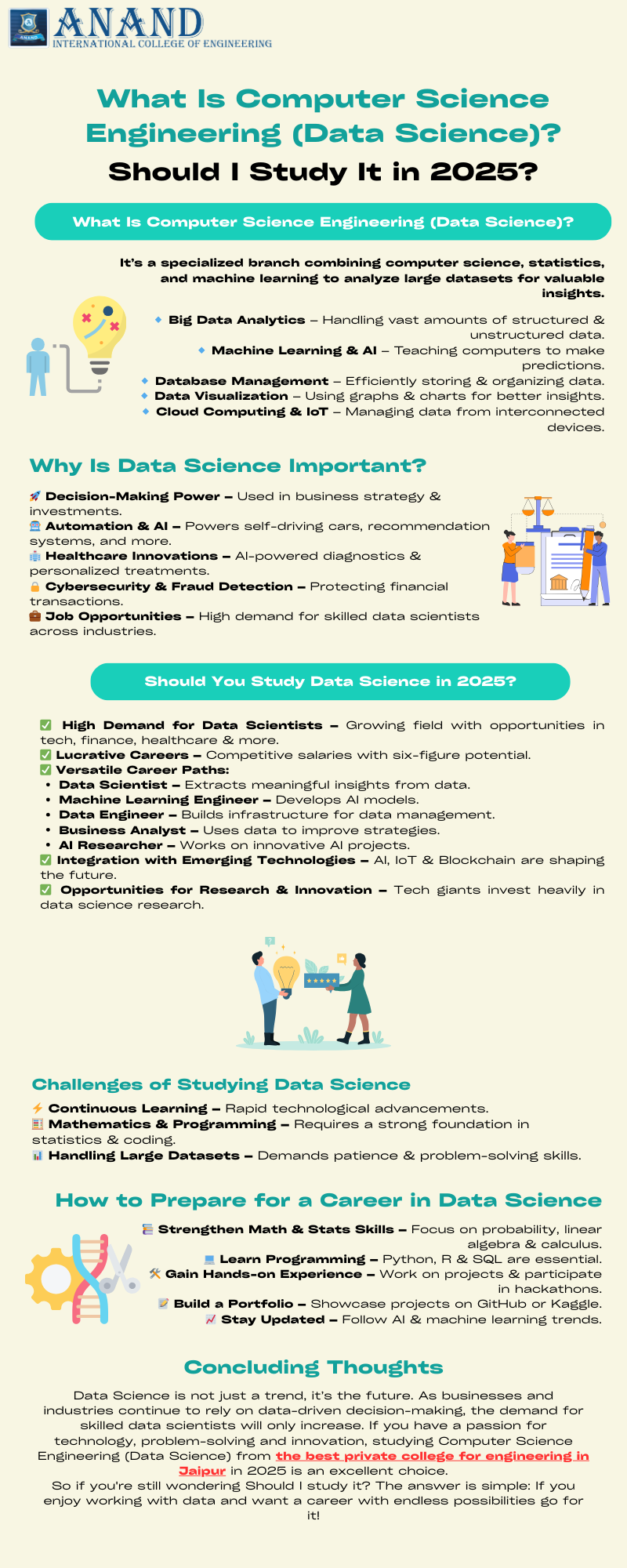The digital era has arrived and data is at the center of it all. Each click, swipe and search creates data, and businesses across the globe are competing to tap into its potential. That’s where Computer Science Engineering (Data Science) from the best private computer science college for engineering in Jaipur enters the picture. If you’re thinking of pursuing a career in this domain, you may be asking yourself: Is it still worth learning in 2025? Let’s simplify it and discuss why data science remains one of the most promising areas of study in engineering.
What Is Computer Science Engineering (Data Science)?
Computer Science Engineering (Data Science) is a specialized branch of engineering that combines principles from computer science, statistics and machine learning to analyze large amounts of data. The goal is to extract valuable insights that help businesses and organizations make informed decisions.
This field includes topics such as:
- Big Data Analytics: Handling vast amounts of structured and unstructured data.
- Machine Learning & AI: Teaching computers to learn from data and make predictions.
- Database Management: Storing, retrieving and organizing data efficiently.
- Data Visualization: Representing data in a meaningful way using graphs and charts.
- Cloud Computing & IoT: Managing data from interconnected devices and cloud platforms.
Why Is Data Science Important?
Data Science is the backbone of many modern technologies and industries. Here’s why it matters:
- Decision-Making Power: Businesses use data science to make critical decisions, from marketing strategies to financial investments.
- Automation & AI: Self-driving cars, virtual assistants and recommendation systems (like Netflix and Amazon) rely on data science.
- Healthcare Advancements: AI-powered diagnostics, personalized treatments and drug discovery are revolutionized through data science.
- Cybersecurity & Fraud Detection: Banks and online platforms use data science to prevent fraud and detect suspicious activities.
- Job Opportunities: The demand for data scientists is booming and companies across industries need professionals who can handle data effectively.
Also Read: Computer Science Engineering in AI vs. Data Science: What’s the Difference?
Should You Study Data Science in 2025?
If you’re wondering whether data science is still a good choice in 2025 the answer is a resounding yes. Here’s why:
1. High Demand for Data Scientists
The job market for data scientists is growing at an impressive rate. According to reports from LinkedIn and the World Economic Forum, data science is one of the fastest-growing fields. Companies across industries like tech, finance, healthcare, retail and even government agencies are hiring data science professionals.
2. Lucrative Career Opportunities
One of the largest draws of data science is its potential for high salaries. Glassdoor and PayScale report entry-level data scientists receive competitive pay, even above the average IT positions. As experience increases, salaries can hit six figures at leading technology firms.
3. Versatile Career Paths
A degree in Computer Science Engineering (Data Science) opens up multiple career paths, such as:
- Data Scientist – Analyzing complex data to find meaningful insights.
- Machine Learning Engineer – Developing AI models and algorithms.
- Data Engineer – Building infrastructure to manage large-scale data.
- Business Analyst – Using data to improve business strategies.
- AI Researcher – Working on cutting-edge artificial intelligence projects.
4. Integration with AI and Emerging Technologies
Data Science is closely tied to AI, IoT and blockchain. These technologies are not fading away anytime soon; in fact they are shaping the future. If you study data science in 2025 you’ll be at the forefront of technological innovation.
5. Opportunities for Research and Innovation
If you enjoy research, data science offers endless opportunities. Universities and tech giants like Google, Microsoft and IBM invest heavily in data science research allowing students and professionals to explore new frontiers in AI and machine learning.
Challenges of Studying Data Science
While data science is an exciting and rewarding field it also comes with challenges:
- Continuous Learning: Technology evolves rapidly and you must keep updating your skills.
- Mathematics & Programming: Strong foundations in statistics, linear algebra and coding (Python, R, SQL) are essential.
- Data Complexity: Handling large datasets requires patience and problem-solving skills.
If you’re willing to tackle these challenges, data science can be an incredibly fulfilling career path.
How to Prepare for a Career in Data Science
If you decide to pursue Computer Science Engineering (Data Science) here’s how you can prepare:
- Strong Foundation in Math & Statistics: Focus on probability, linear algebra and calculus.
- Learn Programming Languages: Python, R and SQL are essential for data science.
- Gain Hands-on Experience: Work on projects, participate in hackathons and do internships.
- Build a Portfolio: Showcase your projects on GitHub or Kaggle.
- Stay Updated: Follow industry trends and advancements in AI and machine learning.
Conclusion
Data Science is not just a trend, it’s the future. As businesses and industries continue to rely on data-driven decision-making, the demand for skilled data scientists will only increase. If you have a passion for technology, problem-solving and innovation, studying Computer Science Engineering (Data Science) from the best private data science college for engineering in Jaipur in 2025 is an excellent choice.
So if you’re still wondering Should I study it? The answer is simple: If you enjoy working with data and want a career with endless possibilities go for it.


